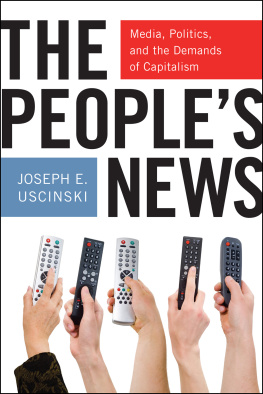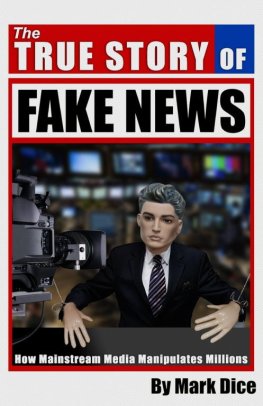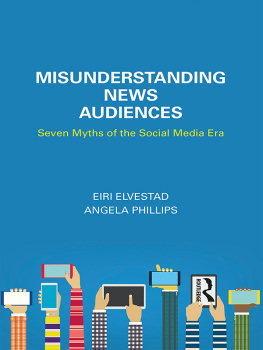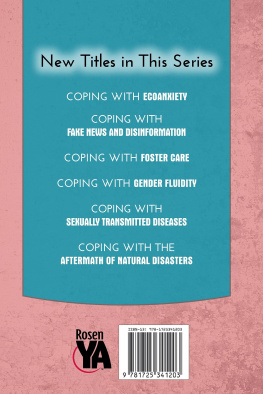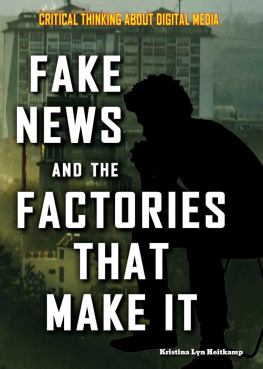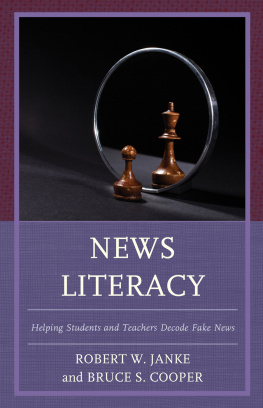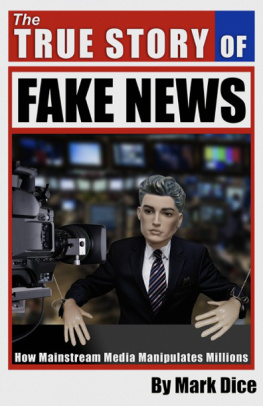Thank you for buying this ebook, published by NYU Press.
Sign up for our e-newsletters to receive information about forthcoming books, special discounts, and more!
Sign Up!
About NYU Press
A publisher of original scholarship since its founding in 1916, New York University Press Produces more than 100 new books each year, with a backlist of 3,000 titles in print. Working across the humanities and social sciences, NYU Press has award-winning lists in sociology, law, cultural and American studies, religion, American history, anthropology, politics, criminology, media and communication, literary studies, and psychology.
THE PEOPLES NEWS
The Peoples News
Media, Politics, and the Demands of Capitalism
Joseph E. Uscinski
NEW YORK UNIVERSITY PRESS
New York and London
www.nyupress.org
2014 by New York University
All rights reserved
References to Internet websites (URLs) were accurate at the time of writing. Neither the author nor New York University Press is responsible for URLs that may have expired or changed since the manuscript was prepared.
For Library of Congress Cataloguing-in-Publication data, please contact the Library of Congress
ISBN: 978-0-8147-6033-8 (cl)
ISBN: 978-0-8147-6488-6 (pbk)
New York University Press books are printed on acid-free paper, and their binding materials are chosen for strength and durability. We strive to use environmentally responsible suppliers and materials to the greatest extent possible in publishing our books.
Manufactured in the United States of America
10 9 8 7 6 5 4 3 2 1
Also available as an ebook
CONTENTS
ACKNOWLEDGMENTS
This work is the culmination of long hours of data collection, analysis, writing, and rewriting. The process has been greatly enjoyable and fulfilling. I always wanted to study news content, but after working on my own, I didnt feel I was quite hitting it. Sitting down with one of my advisors, Brad Jones, we started from scratch and began to craft what would eventually become this book. I first have to thank Brad for helping to set me on this course.
The data collection efforts took about seven years. There are many people for me to thank for this, and I apologize for any errors of omission. First and foremost is Ryan Fitzharrishe is as familiar with this data as I am, and worked with me from the very beginning through the end. I am appreciative of both his hard work and his long-standing friendship. More recently, Alex Alduncin and Marlon Baquedano did an enormous amount of heavy liftingboth in terms of data analysis and in terms of reading through hundreds of hours of transcripts.
I need to thank my other advisors, Jan Leighley and Chad Westerland. Chad, in particular, worked with me rather closely in my final year at Arizona. My colleagues at the University of Miami, during the sometimes grueling sessions of our colloquium series, provided very thoughtful feedbackGreg Koger, Casey Klofstad, Joe Parent, Louise Davidson-Schmich, Merike Blofield, Fred Frohock, George Gonzalez, Chris Mann, Jon West, and Matthew Atkinson. Scholarship is more fun and productive with others, and I am grateful for the time and effort they invested in this work.
I am also grateful to Ilene Kalish and her staff. Ilene has been on board with this book since we first met in August 2010, and has been a great help in moving the book forward. I am greatly appreciative of the opportunity to publish with New York University Press.
I would of course be remiss if I did not thank those in my personal life who have helped and supported me so much during the last few yearsfor their love and support, Leilany, Benny, and Ruby; and my family, Mom, Dad, Kevin, Tracy, Amy, Gram, and Jack. My first introduction to the profession was back in 1993, in Dr. Egberts American Government course at Plymouth State College. I took six more courses with him during my undergraduate careerhe shaped my desire to be a political scientist and I am eternally grateful for that.
My main argument is that audience demands drive news firms to report the stories they reportnews firms want to attract as large an audience as possible. This seems an intuitive argument, but my reading of the literature is that such economic models, particularly when it comes to explaining news content, have often been given short shrift. While university presses are somewhat shielded from raw profit motives, I could not help but be influenced by my own argument as I completed the work. My goal, once the analyses were complete, was to write a book that would appeal to as broad an audience as possible. I was less interested in selling copy per se than in spreading my arguments to anyone who might care to listen.
My personal interest in writing this book was to bring attention to a subject that I care very deeply about. I watch a lot of news. I care both about the content of the information and the way people respond to it. While I do not want to paint the past with rosy hindsight, I think the news environment has gotten worse, and will only continue on a downward trend. I do not want to imply that news is all bad, but I think that as a society we are beginning to see the effects of a segmented news environment. I fear that without a common content or common dialogue, our democracy will not develop much further than it has. I also worry that so much of the precious available news space is wasted on low-quality news and on non-news. But even with these critiques, I am eternally grateful for the freedoms that are protected in this country that allow the news to be what it is, and that allow me to write this book.
1
Introduction
Whose News?
Most television news programs are designed to satisfy the perceived appetites of our audiences. That may be not only acceptable but unavoidable in entertainment; in news, however, it is the journalists who should be telling their viewers what is important, not the other way around.
Ted Koppel, January 29, 2006
After leaving the daily grind of the ABC News Division, veteran anchor Ted Koppel tried his hand as a columnist for the New York Times. Prior to his retirement in late 2005, Koppel had spent decades in the news business; he covered numerous heads of state, natural disasters, major wars, and momentous elections. Rather than focus on the substance of any of these major stories in his first column, Koppel chose instead to discuss a problem he felt could negatively affect election outcomes, public policy, and democratic procedures. In short, Koppel discussed a problem he felt could damage the very fabric of American democracy. This problem is the amount of audience influence over American news programming.
Koppel contended that news firms no longer provide the most important and consequential stories to audiences, an approach sometimes called traditional journalism. Instead, outlets fill precious space with news designed to appease the audiences demands. This leaves audiences without the information necessary to properly function in a democracy. Instead, Koppel argued, news producers have been too willing to abdicate their independent judgment and, as a substitute, adjust news content in response to ratings, audience demographics, and public opinion polls. He claimed that news firms chase audiences and profits at the expense of the public good. In other words, news outlets provide the news people

